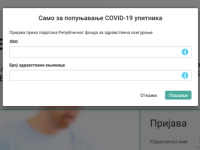From the day one of the declared State of Emergency, the entire primary and secondary education system in Serbia was transferred from classrooms to homes. The classes were taught through the national broadcaster and education online, through several platforms. To be able to follow the online education and to practice for the final exam, the government formed a coalition with the private sector and provided smart phones, tablets and internet for 2.800 eight-graders coming form the disadvantaged…
Response Tag: Adaptive Action
The coronavirus self-assessment test is available to users at the following portal: ezdravlje.gov.rs. After completing the test, users receive further guidance and can establish direct communication with outpatient clinics from the supervision system which they can approach for additional information.
The service is intended for all citizens who have been cured of the COVID-19 virus and who can donate their blood plasma, so as to help in the treatment of newly infected patients.
The enrollment of children in the first grade of elementary schools, which traditionally begins on April 1, will start later this year due to the current situation and the state of emergency. As of Wednesday, April 1, 2020, instead of enrollment, parents and other legal representatives were encouraged to use the interim service, called Expression of Interest, through the new eGovernment Portal. The aim of this service was to establish the "initial" parent-school contact and to assure the parents…
The Office for IT and eGovernment enabled full electronic registration of children in preschool institutions through the eGovernment Portal, for registered users in all municipalities and cities in Serbia. The service was intended for parents throughout Serbia to e-enroll their children in kindergartens, as the kindergartens were temporary closed.
From the Day 1 of the declared State of Emergency and until the end of school year, schools in Serbia were/are closed. However, the classes for all elementary and high school students continued through distance learning. Classes are broadcast on national RTS2 and RTS3 channels, and are available on the RTS Planet platform. Remote teaching in national minority languages is broadcast on RTV, as well as on the channel’s online platform. In the first 2 weeks, RTS teams have recorded over 1,200…
The Danish government launched the COVID-19 infection tracing app Smitte|stop the 18th of June 2020, which has been downloaded more than 660.000 times by the 3nd of July. This corresponds to approximately 12 percent of the Danish population – 14 percent of the population aged 15 years or more. It received the most downloads ever in Denmark by a new app on the first day and first week after publication.
The key function of the app is to notify citizens who have been in close proximity to a…
Covid-19 Response
Epidemiological Reporting System (EMS; a register according to the Epidemic Law §4)
The Epidemiological Reporting System (Epidemiologisches Meldesystem, EMS) is the register established by §4 of the Austrian Epidemic Law. It is the central public information system for handling the Corona crisis (see: https://info.gesundheitsministerium.at/BasisInformationen_en.pdf).
In an EU context, the system is unique in its comprehensiveness. It not only connects all levels of Austrian health administration. In addition, since 2014, all laboratories are obliged by law to report laboratory…
Tax and contribution policy changes
Covid-19 Response
Moroccan response to covid19 in public sector work from home for the administration in public sector
telework in public administration






